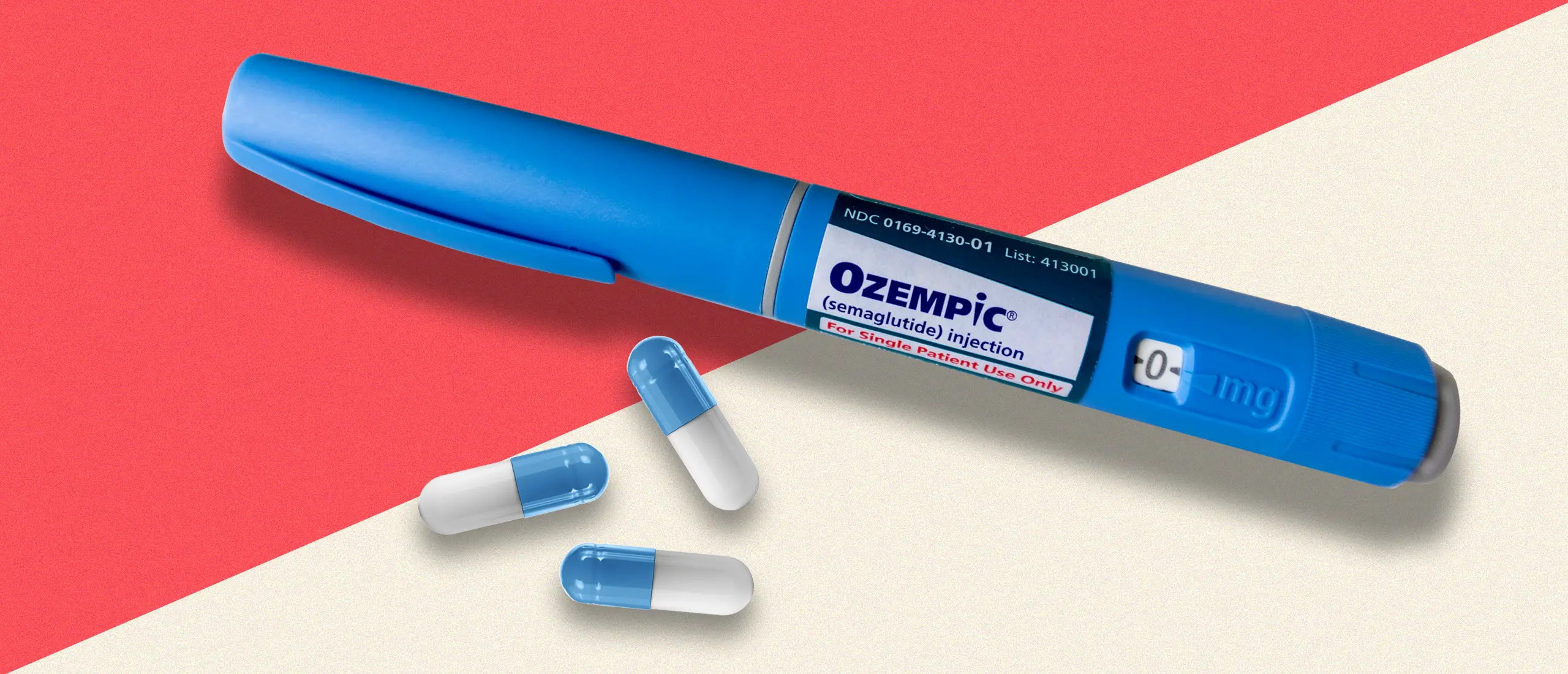Ozempic vs. Phentermine: Which Is Better for Weight Loss?
- By Rebekah Harding
- March 14, 2024
30-Second Takeaway
- Ozempic is a prescription diabetes medication that’s also used off-label for weight loss.
- Phentermine is a stimulant that suppresses appetite and increases calorie burn. It’s typically only prescribed on a short-term basis.
- To qualify for either medication, your BMI has to be over 30 (or above 27 with at least one weight-related condition like type 2 diabetes).
D
emand for the buzzy weight loss drug Ozempic has skyrocketed in recent years: prescriptions for the drug are up by 300 percent since 2020, according to analytics firm Trilliant Health (1). The interest in GLP-1 receptor agonists—along with drug shortages and soaring costs—has also caused older weight loss drugs like phentermine to make a comeback. Between 2022 and 2023, prescriptions for phentermine rose 34%, according to data shared with CNN from Epic Research. But in the ozempic vs phentermine face-off, which works better for weight loss?
That depends.“[Weight loss medication] should be very individualized based on your symptoms, medical conditions, eating habits, basal metabolic rate, and what [weight loss solutions] you’ve tried in the past,” says Janese Laster, M.D., an obesity medicine specialist at Georgetown University Hospital.
We asked two doctors to explain the key differences (and similarities) between Ozempic vs. phentermine, so you have a better idea of which may be the right fit for you.
About the Experts:
Janese Laster, M.D., is board-certified in internal medicine, gastroenterology, obesity medicine, and nutrition at Georgetown University Hospital. She is also the founder of Gut Theory Total Digestive Care, a weight loss clinic in Washington, D.C.
Steven Batash, M.D., is a board-certified gastroenterologist and leading physician at Batash Endoscopic Weight Loss. He specializes in medication-supported and non-surgical weight loss solutions.
Ozempic vs. Phentermine
What is Ozempic (Semaglutide)?
Ozempic is the brand name for a drug called semaglutide. It’s a GLP-1 receptor agonist, which means it mimics the effects of a hormone called GLP-1 in the brain (2).
“GLP-1 is a naturally occurring hormone released from your small intestine when you eat,” says Laster. It slows down how quickly food leaves your stomach, keeping you feeling full for longer. (3).
While some doctors prescribe Ozempic for weight loss alone, it’s only FDA-approved to treat type 2 diabetes. Meaning: even if a doctor writes you a script, if you don’t have diabetes your insurance company won’t foot the bill (4). Another brand name, Wegovy, is the version of semaglutide that is FDA-approved for weight loss. Wegovy and Ozempic are made by the same manufacturer, Novo Nordisk. For a doctor to prescribe Wegovy your BMI has to be over 30 (or over 27 with a weight-related condition, like high blood pressure or sleep apnea) (5).
Ozempic, which is delivered via a once a week self injection, can cause significant weight loss. But experts warn that it’s not a silver bullet.
“Semaglutide injections are prescribed as part of a comprehensive weight management plan that includes lifestyle changes like a balanced diet, regular physical activity, and behavior modification,” says gastroenterologist and family physician Steven Batash, M.D. Making healthy changes to your lifestyle is critical because it helps keep lost weight from coming back: A 2022 study found that people who quit semaglutide regained around two-thirds of their on-treatment weight loss after one year (6).
What Is Phentermine?
Phentermine is one of the oldest, and most widely prescribed, weight loss medications in the U.S. (7). It’s a prescription stimulant, meaning it revs up your body’s systems (8)
“[Phentermine] stimulates the central nervous system to increase heart rate and blood pressure,” says Batash. “Increased heart rate and blood pressure levels can make you feel full.” This may be because activity in your sympathetic nervous system can change the levels of the hormone norepinephrine, which is involved in regulating appetite (9).
Research also suggests that phentermine targets your hypothalamus (the part of your brain that controls how hungry or full you feel) and boosts neurotransmitters that can prevent cravings (9).
You may have heard of phentermine via the popular—but now off-market—‘90s weight loss drug, fen-phen, which combined fenfluramine (another weight loss drug) and phentermine. This medication was pulled due to the risk of heart valve problems and increased blood pressure in the lungs caused by fenfluramine, which can be deadly (10).
Now phentermine is prescribed by itself or compounded with drugs like topiramate, another drug that reduces appetite and helps you feel full longer (11). Clinical trials show that on its own—or in combination with topiramate—phentermine has fewer cardiovascular risks than the OG fen-phen (12).
You can get phentermine as a generic medication or under two brand names, Adipex-P and Lomaira.
Like Ozempic, to qualify for phentermine you need to have a BMI over 30, or have a BMI of over 27 with a weight-related condition (13).
Ozempic vs. Phentermine: Which is More Effective for Weight Loss?
While your doctor has the final say on which weight loss drug is best for you, there’s a few key points to know before going in for your consultation.
Phentermine is most often prescribed to people with metabolic conditions like insulin resistance who struggle to lose weight even after incorporating a healthy diet and exercise into their routine (14).
While brand name Ozempic is mainly prescribed to treat diabetes, semaglutide can quell cravings if you struggle with overeating, which can make it easier to stick to a diet plan while still enjoying your favorite foods in moderation.
Ozempic may also be a better option if you have a heart condition. In fact, semaglutide could actually improve your heart health: A 2021 study found that semaglutide may reduce your risk of cardiac events such as stroke and heart attack by as much as 20 percent (15).
How Effective is Ozempic for Weight Loss?
If you’re struggling with overeating, Ozempic could be the missing ingredient in your health regimen. A 2022 study found that people with obesity who took the medication lost about 16 percent of their body weight in a year (16).
Semaglutide may also lower your risk of cardiovascular disease and type 2 diabetes, since obesity is a major risk factor for both conditions.
The risks of taking Ozempic for weight loss
If your doctor has green-lit a semaglutide prescription, you may encounter common side effects like headaches, nausea, vomiting, diarrhea, abdominal pain, or constipation, warns Batash.
In many cases, these side effects go away after your body adjusts to the medication, according to the Mayo Clinic. But flag any long-term or severe side effects (like fatigue or chronic constipation) with your doctor.
Some people who take Ozempic also deal with gut health issues after starting treatment. A 2023 study revealed that there’s a slightly increased risk for intestinal obstruction (when your intestines can’t contract, making it hard to get rid of waste), because semaglutide slows down food as it travels through your digestive system (17).
If you’re prone to constipation, it may get worse on Ozempic, so drink plenty of water and eat enough fiber (or take a fiber supplement) to keep things moving.
How Effective is Phentermine for Weight Loss?
Many short-term weight loss solutions—like crash diets—are sketchy. But research shows that phentermine can be highly effective in short stints (typically around 12 weeks) especially when paired with a balanced diet and a consistent exercise regimen (18).
A 2010 study revealed that 96 percent of people with obesity who look phentermine for 12 weeks lost at least 5 percent of their total body weight (19). More than half of adults in the study lost more than 10 percent of their body weight. Losing weight also lowered their total cholesterol and LDL (bad) cholesterol levels.
Researchers are still trying to figure out if phentermine is safe and effective as a long-term treatment, but so far the research is promising. For instance, in a 2021 study, 80 percent of adults who took phentermine over the course of six months lost at least five percent of their body fat, with no major side effects (18).
Use the time you’re on phentermine wisely to incorporate healthy habits, since the effects of the medication seem to peter out after six months. (To counter this, some doctors prescribe phentermine on and off so patients can take a break in between treatment cycles). If you don’t build muscle, which supports your metabolism, you could be at risk for regain: In the 2021 study, around 20 percent of people put some weight back on after the study ended.
The risks of taking phentermine
In terms of phentermine side effects, Laster says that the most common ones are dry mouth, gastrointestinal issues like constipation and diarrhea, vomiting, increased heart rate and blood pressure, and insomnia (8).
Most phentermine side effects will stop as your body gets used to the treatment. But pay attention to any long-term side effects, and keep your doctor in the loop.
While stimulant medication can help you lose weight by curbing hunger, experts warn that it can be addictive in some people (9). Proceed with caution if you’ve struggled with any form of addiction. To play it safe, doctors typically prescribe phentermine for short-term use to prevent addiction and misuse, and to avoid potential heart-harming side effects.
References
1 Trilliant Health. 2023 Trends Shaping the Health Economy Report.
2 MedlinePlus. Semaglutide Injection.
3 Collins, et al (2023). Glucagon-Like Peptide-1 Receptor Agonists.
4 FDA. Medications Containing Semaglutide Marketed for Type 2 Diabetes or Weight Loss.
5 Novo Nordisk. Prescribing Wegovy.
6 Wilding, et al (2022). Weight regain and cardiometabolic effects after withdrawal of semaglutide: The STEP 1 trial extension.
7 Rodgers, et al (2012). Anti-obesity drugs: past, present and future.
8 MedlinePlus. Phentermine.
9 ScienceDirect. Phentermine.
10 FDA. ARIA Sufficiency Memo for Fenfluramine-associated Valvular Heart Disease and Pulmonary Arterial Hypertension.
11 Johnson, et al (2023). Topiramate and Phentermine.
12 Jordan, et al (2014). Cardiovascular effects of phentermine and topiramate: a new drug combination for the treatment of obesity.
13 Phentermine Prescribing Information.
14 Garvey, et al (2014). Prevention of Type 2 Diabetes in Subjects With Prediabetes and Metabolic Syndrome Treated With Phentermine and Topiramate Extended Release.
15 Kosiborod, et al (2023). Semaglutide in Patients with Heart Failure with Preserved Ejection Fraction and Obesity.
16 Chao, et al (2022). Clinical Insight on Semaglutide for Chronic Weight Management in Adults: Patient Selection and Special Considerations.
17 Lu, et al (2023). A potentially serious adverse effect of GLP-1 receptor agonists.
18 Cruz, et al (2021). Three- and six-month efficacy and safety of phentermine in a Mexican obese population.
19 Kang, et al (2010). Randomized controlled trial to investigate the effects of a newly developed formulation of phentermine diffuse-controlled release for obesity.











